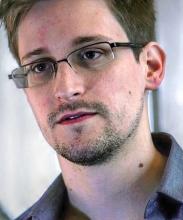What Is It
You might think we each have a moral duty to expose any serious misconduct, dishonesty, or illegal activity we discover in an organization, especially when such conduct directly threatens the public interest. However, increasingly we are seeing whistleblowers punished more harshly than the alleged wrongdoers, who often seem to get off scot-free. Given the possibility of harsh retaliation, how should we understand our moral duty to tell the truth and reveal wrongdoing? Should we think of whistleblowers as selfless martyrs, as traitors, or as something else? Do we need to change the laws to provide greater protection for whistleblowers? John and Ken welcome our era's most renowned whistleblower, former CIA analyst Edward Snowden, for a program recorded as part of the StanfordSymbolic Systems ProgramDistinguished Speaker series.
Listening Notes
The show kicks off with John championing the value of whistleblowing for holding the government and powerful corporations accountable. Ken begins to agree but warns that individuals acting without supervision may debilitate these institutions from functioning properly. The conversation pivots to a discussion about government surveillance, the Patriot Act, and respect for the law—John and Ken taking opposite sides of the debate.
随着讨论转回揭发者的道德品质,《流动哲学报告》(rolling philosophy Report)被归档,爱德华·斯诺登(Edward Snowden)也加入了讨论。约翰问斯诺登,在揭发了美国国家安全局之后,他如何看待自己。斯诺登否认了他甚至为自己着想的说法。在斯诺登重申他对正义的承诺后,肯追问斯诺登,他是如何从中情局和国家安全局的内部人员转变为坚定的反对者的。斯诺登描述了他对政府运作的信心是如何随着时间的推移而逐渐丧失的。
After a short break, Ken makes the distinction between whistleblowing being a matter of duty or choice. Snowden describes the specific nature of the oath he had to take to join the CIA and where his allegiances were aligned. Snowden goes on to distinguish between morality and legality, and how he saw those come apart. Snowden then goes over an example of when the NSA misled Congress and the American people about the breadth of government surveillance. He offers another example explaining how federal courts were also kept out of the loop. Snowden cites a lack of self-correction in systems as justification for whistleblowing.
John and Ken invite members from the audience to ask Snowden questions. Should intent be taken into account for morally or legally evaluating a whistleblower? Was Snowden’s whistleblowing attempting to dismantle the relevant government surveillance programs? Why did Snowden go to the press first instead of publishing the documents off-hand? Snowden’s actions were compared to those of Julian Assange. After a short break, questions continue. Responding to one question, Snowden explains the potential implications of his whistleblowing on actual policy changes. Ken then challenges him that his idealized conception of political liberties is outdated. Snowden, with John concludes on a less hopeful note, contemplating the difficulties of regulating and overseeing our government.
- Roving Philosophical Report(Seek to 6:50): Shuka Kalantari describes the story of Yasir Afifi, who had been tracked and closely surveyed by the FBI without a warrant, and the proceeding lawsuit Afifi filed against the FBI.



